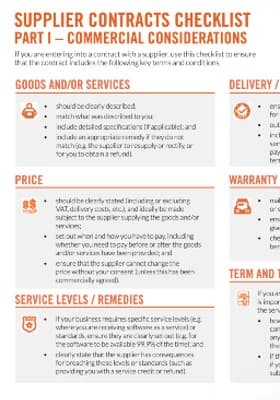Table of Contents
As a business customer, you should be careful about who you do business with. This means carefully reviewing and vetting potential suppliers to make an informed decision before signing a contract. As a customer, you may need to pay the supplier high fees or divulge confidential information. As such, it is vital to assess the suitability and reliability of the supplier in advance through a robust diligence process. Supplier due diligence can help you achieve this. This article will explore the benefits of supplier due diligence before signing a contract with a supplier.
What Is Supplier Due Diligence?
This is the process under which you will investigate a supplier, and their business operations and ask any relevant questions or concerns you have regarding their contracting process.
Supplier due diligence is critical to avoiding potential obstructions and problems you may otherwise face as a business customer. It can help prevent problems by identifying red flags and potential issues a business could face.
Working with a particular supplier could cause several risks for your business.
To explore some of the key risks:
- the supplier could have a poor track record of service delivery and may have left several customers unsatisfied;
- a supplier could have poor data security and standards, which could risk a personal data breach for which your business could be held liable; or
- a supplier may have unclear payment practices, meaning your business risks losing money and hidden costs.
Due diligence is the process of inspecting a potential business supplier to understand their ethos and practices and uncover any problems that could risk your business.
Due diligence can also enable you to understand whether you should negotiate particular terms in your contract with the relevant supplier to protect your business from risk. For instance, if they are a small or inexperienced business, you may wish to negotiate specific terms to comfort you, such as the obligation to maintain certain insurance during the contract term to cover their potential liabilities.
What Questions Should You Investigate?
Depending on the products or services and critical risks for your business, you may need to investigate various issues and ask questions as part of your supplier due diligence.

Download this free Supplier Contracts Checklist to ensure your contracts will meet your business’ needs.
This will also depend on the industry you operate in and the value and length of the contract. As such, due diligence does not follow a one-size-fits-all approach.
Some of the critical questions to ask may include:
- Is the supplier an established business, and what is its reputation like? Will they be a good fit for your business, and can they deliver the services or products you need?
- Does the supplier have insurance in place to cover its potential liabilities?
- Do they have a process for resolving customer queries and disputes?
- Do they comply with applicable laws, including data protection laws? This is particularly important when sharing your data with them.
- Does the supplier have policies and procedures to deal with anti-bribery and corruption, for instance, to comply with the requirements of the Bribery Act 2010?
- Do they have a business continuity plan in place in case a disaster impacts their business operations?
- What are their processes for maintaining your confidential information? Do they train staff on confidentiality obligations?
- Do they have security systems to safeguard customer data, materials and information?
By asking such questions, you will better understand the supplier’s background and processes and make an informed decision about working with them.
Continue reading this article below the formCall 0808 196 8584 for urgent assistance.
Otherwise, complete this form and we will contact you within one business day.
Is Supplier Due Diligence Before a Contract Important?
There are various reasons why customers should conduct due diligence before signing a contract. The extent of your due diligence efforts will depend on your timeframes, resources, and project value. For instance, a high-value and long-term project may require extended due diligence.
Due diligence can benefit your business in many ways. Some key benefits include:
- a chance to walk away from risk. For instance, discovering that a supplier has a poor reputation or reviews could help save you the trouble of working with them and facing problems with their service delivery;
- the chance to build trust. A supplier’s due diligence answers and engagement can help foster a relationship of trust and collaboration. If a supplier is open and helpful, you may be able to understand how your working relationship could work; and
- the opportunity to mitigate risks contractually. If you discover issues that could create risk for your business, you could mitigate against them by negotiating critical terms in your contract. For instance, you could negotiate the right to a refund or cancellation rights if you require an exit route or specific remedies.
If you require support understanding how to mitigate due diligence risks contractually, you can work with an experienced commercial lawyer to support you.
Key Takeaways
As a customer, you should always be cautious before entering new supplier contracts. If not, you could face the risks of poor service delivery and other problem issues. Due diligence is carefully examining suppliers to assess whether they will fit your business well and consider any risk issues you may face. For instance, due diligence will allow you to determine if the supplier has a good reputation and if they will safeguard any confidential information or personal data you share with them during a contract.
By carrying out thorough due diligence, you may be better positioned to assess risks and avoid contractual problems you could otherwise face later.
If you need advice on what to do before signing a contract, LegalVision’s experienced commercial contract lawyers can assist as part of our LegalVision membership. For a low monthly fee, you will have unlimited access to lawyers to answer your questions and draft and review your documents. Call us today on 0808 196 8584 or visit our membership page.
We appreciate your feedback – your submission has been successfully received.









